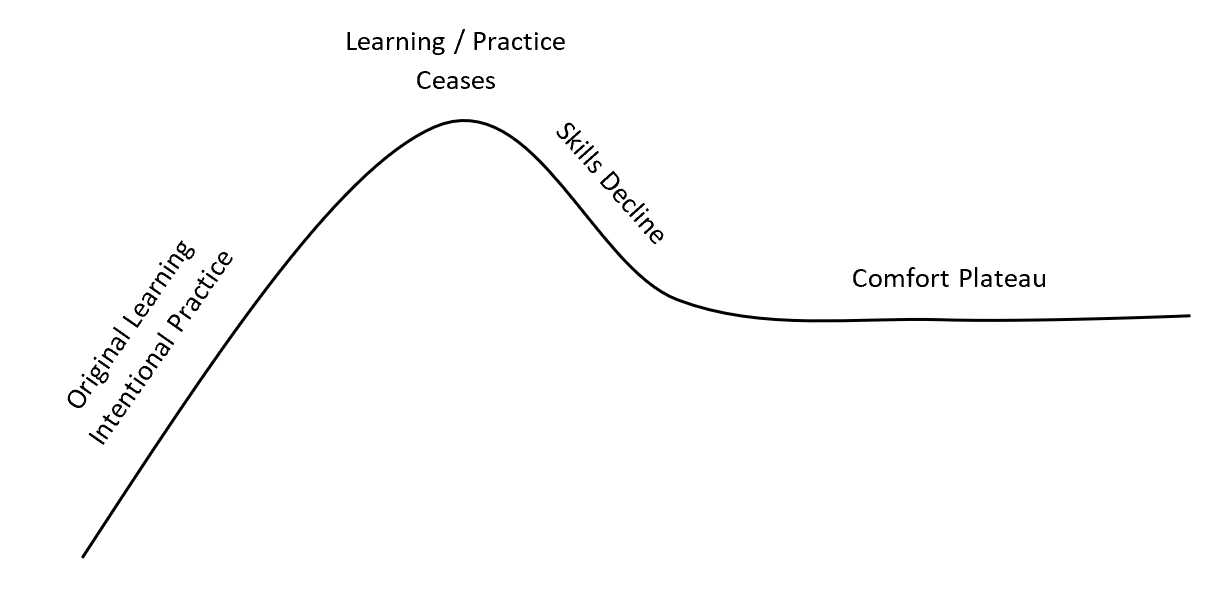Losing and Regaining the Edge of Expertise
Posted on July 23, 2019
I have always been intrigued at how quickly we can lose our expertise edge. I have found over time that in some areas I have improved rapidly, gaining new levels of mastery. Then, instead of continuing to push further into new and higher levels of mastery, I became comfortable, lost my edge and plateaued. My development in dancing provides a good example.
A number of years ago, I wanted to dance confidently in a social setting. I embarked on six months of rigorous ballroom lessons with an instructor and improved immensely to the point where I could get on any dance floor and do a reasonable job of it (or at least that was my perception). Once I had reached this level, I stopped taking lessons, entered a skill decline to a position I've termed the comfort plateau. I still have a blast dancing but not with the growing proficiency I had been developing previously. The following graphic demonstrates the learning curve and subsequent decline.
[caption id="attachment_3960" align="aligncenter" width="1222"] Skills Decline and Plateau[/caption]
Consider the following people, leadership and organisation examples. There’s…
Skills Decline and Plateau[/caption]
Consider the following people, leadership and organisation examples. There’s…
 Skills Decline and Plateau[/caption]
Consider the following people, leadership and organisation examples. There’s…
Skills Decline and Plateau[/caption]
Consider the following people, leadership and organisation examples. There’s…
- David, who in the early years of learning his particular career-skills, grew in knowledge and expertise, yet did not notice how over the years his learning first slowed and then stopped entirely. Now, the world has moved on and he hasn't kept pace with younger team members who are demonstrating more expertise after three years than after his thirty years of experience.
- Smith and Co. Insurance Services, who sent their managers to the Understanding Personalities and Communications Course. Positive shifts were noticeable early on and the vibe in the office lifted; but, they didn't continue to support their people to embed and expand their fledgling skills via ongoing development. So while some things are slightly better, infighting, conflict and communication issues are still too frequent.
- Fiona, who learned how to sell, found success early and then never improved her conversion ratios. She stopped intentionally learning and practising.
- Acme and Sons, who drove their quotation win rate to 25% through analysis and a series of deliberate changes. However, their new success made them feel secure, and so they stopped the change process; now their rates have dropped to 18%. They believed they’d done enough to at least maintain the 25% ongoing.
- Alex, who intentionally worked on his negotiating skills. However, his improvement ceased this side of a fail point he has encountered many times with master negotiators. Why is Alex willing to keep on having repeated experiences of the same problem? Then…
- When Sandra started her business, she learned the basics of management, finance and leadership and got on with doing business. Now, she finds her organisation has plateaued over the last five years and never gets past 50 personnel. She sometimes wonders why.
Getting The Edge Of Expertise Back
Anders Ericsson and Robert Pool in their exceptional book Peak: Secrets From The New Science of Expertise recommend deliberate practice as a way of focusing in on the elements of a skill—you could call these micro-skills. They suggest practising these micro-skills and using data and feedback to measure your progress towards mastery. Working in a step-by-step way, patiently analysing progress and making subtle improvements and then doing it all again will ultimately give you success. And most often, it’s impossible to do this on your own. Consider the Olympic ice skater, who just can’t figure out on their own, why they fall on a particular trick every time, but with the help of a coach can quickly identify and fix the problem. Getting your edge back is about identifying where you have plateaued, and then deliberately engaging in intentional learning, coaching and practice. Or, as Ericsson and Pool so aptly elaborate, "Deliberate practise nearly always involves building or modifying previously acquired skills by focusing on particular aspects of those skills and working to improve them specifically; over time this step-by-step improvement will eventually lead to expert performance."View latest blog articles
